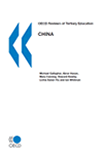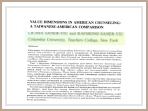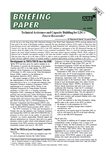 This Country Note offers independent, external observations of the tertiary education sector in the People’s Republic of China.1 It forms part of the OECD Thematic Review of Tertiary Education. The Thematic Review is designed to examine policy frameworks and settings for tertiary education across participating countries. The scope of the Review considers tertiary education in its broad economic and labour market context, as well as its linkages with the other sub sectors of education.
This Country Note offers independent, external observations of the tertiary education sector in the People’s Republic of China.1 It forms part of the OECD Thematic Review of Tertiary Education. The Thematic Review is designed to examine policy frameworks and settings for tertiary education across participating countries. The scope of the Review considers tertiary education in its broad economic and labour market context, as well as its linkages with the other sub sectors of education.
![]() Article
Article
 This paper is a discussion of prevailing American value dimensions in conseling theory and practice in general and a comparison of Taiwanese (Taiwan, Province of China) and American counselling value dimensions in particular.
This paper is a discussion of prevailing American value dimensions in conseling theory and practice in general and a comparison of Taiwanese (Taiwan, Province of China) and American counselling value dimensions in particular.
![]() As part of the work programme of the Geneva Trade and Development Unit, a comprehensive analysis was undertaken of the 29 Diagnostic Trade Integration Studies (DTIS) available as of October 2008 to assess whether and to what extent the DTISs provide concrete recommendations and actions which can support comprehensive strategies for promoting, upgrading, diversification and value addition in manufacturing and related industrial development activities associated with commodity production. Although DTISs were not designed as a commodity development tool, it is important to recognise that for most of the Least Developed Countries primary commodities including agricultural and mineral commodities are the main source of income, employment and trade. For many of these countries, their journey out of poverty is linked to the development of the commodity sector.
As part of the work programme of the Geneva Trade and Development Unit, a comprehensive analysis was undertaken of the 29 Diagnostic Trade Integration Studies (DTIS) available as of October 2008 to assess whether and to what extent the DTISs provide concrete recommendations and actions which can support comprehensive strategies for promoting, upgrading, diversification and value addition in manufacturing and related industrial development activities associated with commodity production. Although DTISs were not designed as a commodity development tool, it is important to recognise that for most of the Least Developed Countries primary commodities including agricultural and mineral commodities are the main source of income, employment and trade. For many of these countries, their journey out of poverty is linked to the development of the commodity sector.
 In the run up to the Hong Kong (HK) Ministerial Meeting of the World Trade Organisation (WTO), growing attention has been paid to the needs of developing countries, especially the least developed countries (LDCs) many of whom face depend persistent poverty and indebtedness. Judging from the draft Ministerial Text submitted by Chairman of the General Council (GC) and the Director-General (DG) to the WTO members in anticipation of the HK Ministerial Meeting, the concern about the plight of the LDCs seems to have increased considerably. There is a need for initiating measures to improve the trade related technical assistance (TRTA) and trade related capacity building (TRCB). While calling for improved aid is laudable and urgently needed, at the same time member countries should take a step back and reflect on what has been done so far in the name of TRTA in order to reach an agreement on TRTA at the HK Ministerial Meeting which will have sufficient chances of actually leading to sustained improvement of living conditions in the LDCs.
In the run up to the Hong Kong (HK) Ministerial Meeting of the World Trade Organisation (WTO), growing attention has been paid to the needs of developing countries, especially the least developed countries (LDCs) many of whom face depend persistent poverty and indebtedness. Judging from the draft Ministerial Text submitted by Chairman of the General Council (GC) and the Director-General (DG) to the WTO members in anticipation of the HK Ministerial Meeting, the concern about the plight of the LDCs seems to have increased considerably. There is a need for initiating measures to improve the trade related technical assistance (TRTA) and trade related capacity building (TRCB). While calling for improved aid is laudable and urgently needed, at the same time member countries should take a step back and reflect on what has been done so far in the name of TRTA in order to reach an agreement on TRTA at the HK Ministerial Meeting which will have sufficient chances of actually leading to sustained improvement of living conditions in the LDCs.
CSEND conducted research on how to best include employment and decent work into the Poverty Reduction Strategy Papers (PRSP), the successor instrument of the IMF/WB following their failed Structural Adjustment Programme (SAP). CSEND drafted a major document titled "Decent Work and Poverty Reduction Strategies: An ILO Advocacy Guidebook" and developed a 24 role negotiation simulation concerning PRSPs. The simulation was pilot-tested in Ethiopia (2003) and Cameroon (2005). The Guidebook was published by ILO, Geneva, April 2005.
Saner, R.; “O negociador experiente". Senac (Editors),
Sao Paulo, Brazil, 2002.
Saner, R.;“Zur Kultur eines Berufs: Was ist ein Diplomat?”. Auswärtiges
Amt- Diplomatie als Beruf, Brandt/Buck (Hrgs.), pp. 333-339. Leske & Budrich, Opladen 2002.
Saner, R.; “El Experto Negociador”. Paul Haupt Verlag (Editors), Los
Amigos del Libro, Bolivia, 2002.
Saner, R.; Yiu, L.; “External Stakeholder Impact on Third-Party Interventions in Resolving Malignant Conflicts: The Case of a Failed Third-Party Intervention in Cyprus”. International Negotiation, Vol. 6: 387-416, 2001.
Saner, R.; Becerra, M. (editors); "Trade Negotiations Cases, Analyses, Strategies at Bilateral, Regional and Multilateral Levels: Bolivia 2001", (English and Spanish), Los Amigos del Libro, La Paz, 2001
Saner, R.; Jauregui, S; Yiu, L; "Climate Change and Environmental Negotiations: Global and Local Dynamics"; Los Amigos del Libro, La Paz, 2001.
The objective of this paper is to focus on one aspect of European regional integration which has been given insufficient attention so far by scholars and policy analysts alike. In particular, the question which this articles attempts to answer is how to nurture the development of sustainable trans-border regional cooperation and trans-border integration. The large majority of existing regional studies focus on competitiveness of intra-national regions like Baden-Würtemberg (South-Western Germany) or Lombardy (Northern Italy).
Saner, R.; Maidana, I; "Trade Negotiation Case, Analyses, Strategies at
Bilateral, Regional and Multilateral Levels: Bolivia 2000", Los Amigos del Libro, La Paz, 2001.
Saner, R., Yiu, L., Sondergaard, M.; "Business Diplomacy Management: A Core Competency for Global Companies". Academy of Management Executive, Vol. 14 (1), February, 2000.
Wahl, U., Saner, R.; "Zur Verhandlungstechnik- Ueber Strategien und Taktiken". Index- Fachmagazine Betriebswirtschaft, Vol. 3, 1998.
Saner, R.; “Verhandlungstechnik”. (in German), Paul Haupt Verlag, Berne, 2008 (2. Auflage)
“Socio-Economic Foundations of a Just Society”, Special Report from the 1996 Conference of the Society for the Advancement of Socio-Economics, Centre for Socio-Eco-Nomic Development. Geneva. 1996.
Saner, R., Yiu, L.; “Conflict Handling Styles in Switzerland- Some Preliminary Findings & Initial Interpretations”. Die Unternehmung, Vol. 2, 1993.
Beyond the public's occasional glimpse of the work carried out by the International Committee of the Red Cross (ICRC) lies an untold story of human vulnerability that is largely unresearched. The informed public generally admires ICRC's 125-year history of caring for the war wounded, of protecting the lives of prisoners of war, and of providing relief to civilian populations affected by armed conflicts...
This articles describes the use of action learning and action research in the development of management training institutions and management development experts in China. A case study is reported here which was based on a technical cooperation project between Switzerland and China which took place from 1994 to 1996. The aim of this project was to build up the Chinese Government’s institutional capacity in support of its policy to modernise its public administration and to strengthen its management of public enterprises.
Saner, R., Yiu, L.; "Transnational Leadership: The Role of Field Dependence/Independence". Technical Reports HEC. No. 19. Geneva, October, 1994.

Les revendications envers un service public avec un fonctionnement davantage orienté sur l'action, l'efficacité et la réduction des coúts ne se sont pas apaisées au cours de ces dernières années.
Les modifications de l'environnement économique, les exigences accrues de la clientèle, la raréfaction des ressources, l'amélioration des connaissances et les nouvelles technologies constituent autant de nouvelles condition-cadres pour le service public ...
![]() Countries suffering from high transactions costs are often victims of administrative inefficiencies and policy ineffectiveness at central governmental level. The objective of this article is to describe such inefficiencies and ineffectiveness as they presented themselves after Slovenia reached independence from the former Yugoslavia in 1991. In particular, the author describes the multiple causes of inefficient administrative and ineffective policies as they presented themselves in the subsequent period of gradual administrative modernization during the years of 1993-1996.
Countries suffering from high transactions costs are often victims of administrative inefficiencies and policy ineffectiveness at central governmental level. The objective of this article is to describe such inefficiencies and ineffectiveness as they presented themselves after Slovenia reached independence from the former Yugoslavia in 1991. In particular, the author describes the multiple causes of inefficient administrative and ineffective policies as they presented themselves in the subsequent period of gradual administrative modernization during the years of 1993-1996.
Public administrations in all parts of the world are faced with multiple pressures to innovate and improve effectiveness and efficiency. Reforms range from New Public Administration (NPM) to other forms of reorganizations like ‘‘gestion publique par contrats’’ (France, Belgium) resulting in various forms of New Public Administrations (NPA).
Globalization exerts powerful pressures on our national government and public administrations. Most distinctive are the pressures regarding public management effectiveness and the internationalization of the civil service. The former demands that traditional public administrative culture be transformed into a managerial culture, the latter involves increasing alignment of national policies and relations with the private sector according to international standards and practices. Civil servants are pushed by these trends to expand the definition of their role and to acquire new knowledge and skills in order to meet this challenge of globalization.
Saner, R.;"Globalization and its impact on leadership qualification in public administration". International Review of Administrative Sciences, Vol. 67: 649-661, 2001.
![]() Article
Article
Qualifications: Reflections and Responses". Asian Journal of Public Administration, Vol. 22 (1), June, 2000.
The goal of this paper is to present the case example of China in its development effort of future leaders within the public sector. This case example will first describe the leadership
model currently in use in China as the basic framework of assessment, selection and development of leaders befitting the tasks requirements of the 21st century. Narrative description will be given regarding the actual practices regarding leadership assessment, selection and development in China.
Das Ziel dieses Artikels besteht darin darzulegen, wie die Action-Learning-and Action-Research-Methoden innerhalb eines New-Public-Management-Reform-Projektes eingesetzt werden konnen, and aufzuzeigen, wie dadurch der Transfer von New-Management-Know-how an die Kundenorganisation sichergestellt werden kann .
Saner, R., Yiu, L.; “Institutioneller Aufbauprozess der Zentralverwaltung Sloweniens Mittels Action Learning und Action Research“. Information Internationalen Treuhand AG, Nr. 103, Basel, April, 1998.
![]() Article
Article
“Compendium of Pilot Projects for Improving Working Procedures in the Slovene Public Administration"
Weiterbildung: Kommunikation, Information und Einbezug der Anspruchsgruppen in der schweizerischen Bundesverwaltung“, (Interface Management of In-Service Training of Switzerland’s Public Administration) (in German), Paul Haupt Verlag, Berne, 1997.
Partnership 1986-1996”. 3rd International Conference of the International Institute of Administrative Sciences Brussels on “New Challenges for Public Administrations in the Twenty-First Century” . Beijing. October, 1996.
Crevoisier, J.; "Interview avec M. Raymond Saner - Pour réinventer la Suisse, allons à Singapour". La Suisse est-elle soluble dans l’Europe. Journal de Genève, Gazette de Lausanne. George Editeur, 1996.
![]() Article
Article
Saner, R., Yiu, L.; “The Need to Mobilize Government Learning in the Republic of Slovenia”. The International Journal of Public Sector Management, Vol. 9 (5/6), 1996.
The transition from command economy to market economy, and from Soviet rule to parliamentary democracy, has turned out to be more problematic than had been anticipated by many western policy advisors. By applying Sachs "Shock-Therapy", many government officials of Central and Eastern European Republics (CEER) ...
Saner, R.,Yiu, L.; “Learning from the Asian NIC’s: Policy Options for Central & Eastern European Republics”. Advances in International Comparative Management, Vol. 9: 253-275. 1994.
![]() Article
Article
